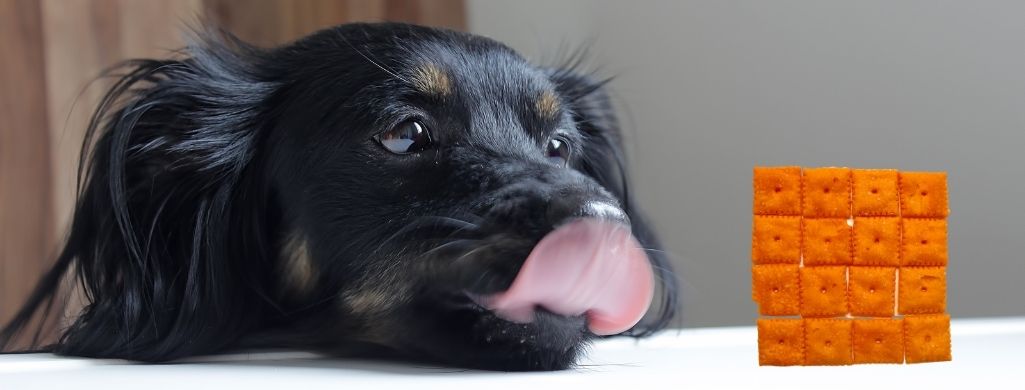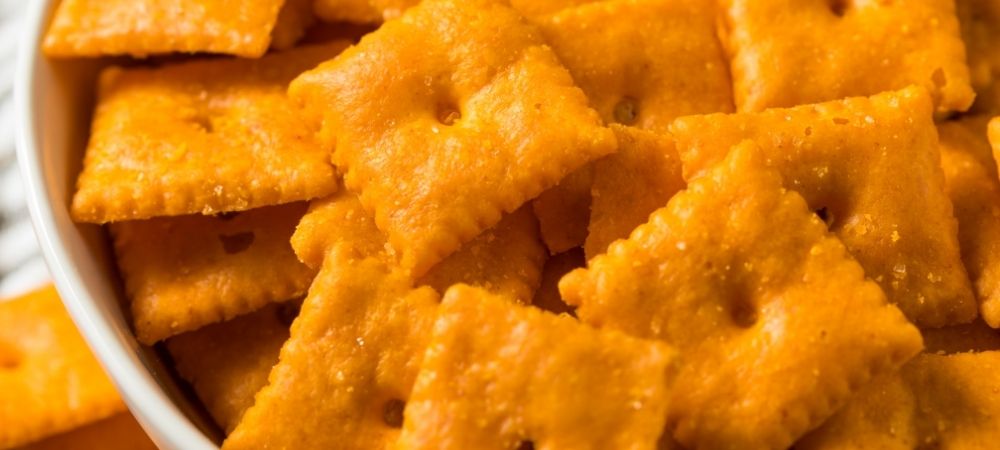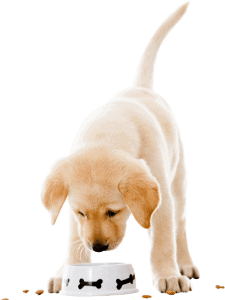
Last night, I put on a Netflix show and decided to relax with some Cheez Its. I eat them rarely — these things easily get out of hand and inevitably end up in my mouth.
I was so focused on the show that I didn’t even notice when my canine grabbed a tiny bit of Cheez Its and started munching.
This got me worried. Can dogs eat Cheez Its, even a smidgeon? Will Piper be ok?
So I decided to look into it. Check out what I learned.
Can Dogs Eat Cheez Its?
No, dogs should not eat Cheez Its crackers. They are not suitable dog food.
Cheez Its are too high in salt, dairy, and fat. These are harmful to your dog and can cause weight gain, obesity, food allergies, and salt toxicity. Cheez Its also have other harmful ingredients: TBHQ, soybean oil, wheat flour.
If your dog ate a single Cheez It or a few, they should be fine. However, you should not make them a regular part of a dog’s diet.
Are Cheez Its Bad for Dogs?
Cheez Its have no particular health benefits for our canine friends. They have some vitamins and minerals, but the ingredients that are bad for dog’s health far outweigh them.
Let’s look at the common Cheez Its ingredients and overall calories to see whether they are bad for dogs.
Salt
One serving (27 Cheez Its crackers) contains a whopping 320 mg of sodium. Even for humans, this is a bit too much. An average human needs roughly 2 300 mg of sodium daily, so one serving provides 14% of that number.
In dogs, the serving far exceeds their daily needs. A 30-pound dog needs only about 100 mg of sodium for an entire day. Just one serving of Cheez Its exceeds the recommended sodium intake three times.
If your dog eats lots of salt and shows symptoms like unusual thirst and frequent urination, along with vomiting and diarrhea, you should take them to a vet.
Over time, high sodium intake leads to weight gain, obesity, diabetes, heart disease, high blood pressure, respiratory problems. Too much salt in a dog diet eventually results in sodium ion poisoning, which is a severe medical condition that can result in the death of a pet.
Dairy
Cheez Its contain skim milk. Dairy products are harmful to lactose intolerant dogs, and most dogs develop lactose intolerance as they age.
Skim milk can upset a dog’s stomach and cause vomiting, diarrhea, and other gastrointestinal issues. The symptoms often disappear within a few hours. If they last longer, you should call a veterinarian.
Sour cream is another dairy product that could be bad for dogs — some varieties are even toxic.
Cheese
One of the prominent ingredients in a Cheez It is cheese, obviously. Besides being a dairy product, cheese is also loaded with fat.
Both of these cause many health issues in a dog. If your dog eats Cheeze Its regularly, too much fat will contribute to weight gain, obesity, diabetes, arthritis, heart problems, and pancreatitis.
Pancreatitis is particularly worrying. It is a painful and severe inflammation of the pancreas which requires a long, even a life-long, treatment. The untreated pancreas can be the cause of a pet’s death.
Enriched flour
Enriched wheat flour is one of the main ingredients in Cheez Its. If your dog is sensitive to wheat and gluten, don’t feed them these crackers. They are likely to trigger an allergic reaction. Some of the symptoms include dry and itchy skin, bald spots, inflamed paws, and stomach upset.
If you are unsure about your dog’s food allergies, take them to a vet. The vet can easily determine all the allergens by running a few tests.
Even when your dog isn’t allergic to gluten, flour can still cause weight problems and contribute to related health issues, like heart problems and diabetes. For this reason, you might re-consider letting your dog eat Cheez Its.
Soybean and TBHQ
Cheez Its crackers contain soybean oil and TBHQ, both of which are harmful to our canine friends.
Dogs can be allergic to soy. The typical symptoms include scratching ears frequently (potential ear infection), yeast infection, hair loss, excess skin oil, diarrhea, vomiting, and eyelid inflammation. Skin infection can also be accompanied by pus. If you notice these symptoms, take them to a vet immediately.
TBHQ stands for tertiary butylhydroquinone, which is a preservative in Cheez Its and other commercial food products, like pop tarts. It is known to be bad for dogs. TBHQ can damage a dog’s DNA and is considered cancerogenic. It’s one of the many reasons why Cheez Its are best avoided.
Annatto Extract
Have you ever wondered where the orange cheese color comes from? This is all annatto’s doing. Annato extract is an additive and vegetable dye responsible for the color. If the cheese is bright yellow or orange, it probably contains annatto.
Annato could potentially cause hypoglycemia in dogs, so dogs should not eat it.
Paprika
Paprika is also an ingredient in Cheez Its. It is not considered toxic to our furry friends, but it is harmful. Spicy foods generally aren’t the best choice for a dog’s diet.
Paprika might cause gastrointestinal upset, diarrhea, and vomiting. Additionally, the dog might experience burning sensations and an irritated throat. Usually, these should resolve within a few hours. If they continue, call a vet.
Calories
One serving of Cheez Its contains 27 crackers and 210 calories. This number is not too bad for dogs, but the calories have little to no nutritional value.
Furthermore, they mostly come from dairy and fat — one serving has 0.39 oz of fat and 0.09 oz of saturated fat. Long-term effects of fat ingestion include obesity, diabetes, liver and kidney failure, pancreatitis. These are all serious medical conditions and potentially deadly to your pet.

Different Types of Cheez Its
Can dogs eat Cheez Its varieties? Let’s look at a few and if your furry friend should consume them.
Can Dogs Eat White Cheddar Cheez Its?
No, dogs should not eat White Cheddar Cheez Its.
White Cheddar Cheez Its have all the ingredients of the regular ones. Meaning the white cheddar flavor is very high in both fat and sodium. Too much fat is detrimental to a dog’s health and contributes to weight problems, diabetes, arthritis, and pancreatitis.
Excess salt can also be very dangerous — depending on the amount, it may quickly develop into salt poisoning. Salt poisoning is accompanied by extreme dehydration and organ failure, seizures, coma, and it can be fatal for our pets.
Can Dogs Eat Hot and Spicy Cheez Its?
No, Hot and Spicy Cheez Its are not safe for your dog.
Spicy foods are generally bad for dogs. A spicy Cheez It can cause an upset stomach, throat irritation, and burning sensations around the eyes and mouth. These Cheez Its are very likely to cause vomiting, too.
These symptoms should clear out within a few hours, but if they don’t — you should take your dog to a vet.
Can Dogs Eat Cheese Crackers?
Yes, dogs can eat some cheese crackers in moderation and on very rare occasions if they are not lactose intolerant.
Cheesy crackers still contain a lot of salt, fat, and dairy. They are usually very high in calories. All of these can cause problems if ingested regularly.
Different cheese crackers are more dangerous than others, and you should avoid them completely. Make sure to read the ingredients and avoid high-salt, high-fat cheese crackers, as well as toxic ingredients.
What Should You Do if Dog Ate Cheez Its?
One or a few Cheez Its are unlikely to cause harm to your pooch. They will probably experience a digestive upset, diarrhea, and vomiting in more severe cases. These symptoms usually turn back to normal in a day or two. If they continue, it’s best to call a vet.
However, if your dog ate Cheez Its in large amounts, they might develop sodium ion poisoning. Cheez Its are very high in salt, and you should act fast. Monitor the dog for symptoms of salt toxicity and call a vet immediately.
Salt Toxicity
The biggest concern with ingesting too many Cheez Its is the salt toxicity in dogs. Typical symptoms of sodium poisoning include:
- Excessive thirst
- Lethargy
- Vomiting
- Diarrhea
- Fluid accumulation
- Kidney failure
- Tremors
- Seizures
- Coma
If you notice the symptoms, take your dog to a vet clinic immediately. Do not try to induce vomiting yourself unless instructed by the vet, and make sure your dog always has access to fresh water.
Alternatives
Cheez Its may be crunchy and appealing, but there are so many healthier choices for your furry friend. Some of these foods have a nice chewy structure and offer many more health benefits for your dog. Try one of the following:
- Apples
- Carrots
- Peanut butter (always check for xylitol)
- Baked potatoes
- Broccoli
With these, your dog will be safe and healthy. There are many other options you can try.
Definitely Not Binge-Worthy
So, can dogs eat Cheez Its? I recommend against it. Cheez Its are high in salt and fat, they can trigger many food allergies, and contain many harmful additives. It’s best to avoid them altogether.
Understandably, we want to share human food with our furry family members. Still, dogs should not eat anything with that many harmful substances. Our pet’s health comes first.
One or two occasional Cheez Its won’t kill your dog, but it’s much better to find a healthier alternative. Or even prepare a dog treat yourself. Why not? It is a great way to bond with your pet and provide them with healthy treats.
FAQ
Are Cheez Its toxic to dogs?
Cheez Its don’t contain typical toxic ingredients, like onion and garlic, or xylitol. Always check the ingredients, though. However, they do contain TBHQ, a preservative that is considered carcinogenic and causes seizures in dogs.
Can dogs have reduced-fat Cheez Its?
No, they should not. A reduced-fat Cheez It still has too much salt, fat, and other harmful ingredients. If a dog eats one Cheez It, they are unlikely to cause much harm. However, regular ingestion can be very dangerous.
Do dogs like Cheez Its?
Like many junk foods, Cheez Its can become addictive to your dog because of the fat and salt. However, they should never become a regular treat. One Cheez It may be fine for your dog, but it’s best to avoid them.

